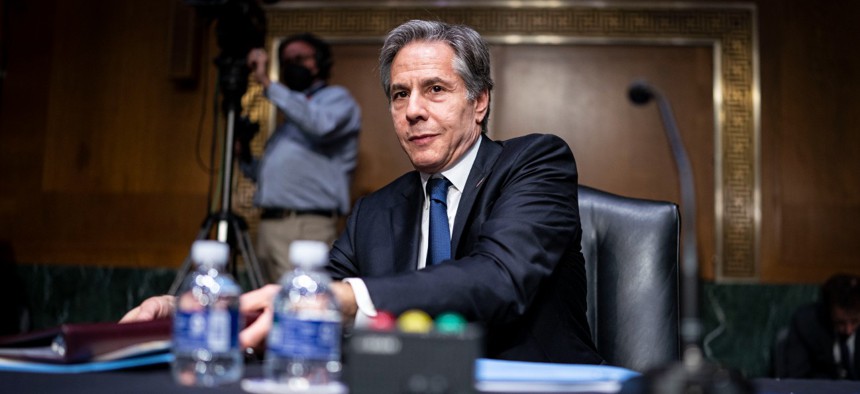
Secretary of State Antony Blinken speaks during a Senate Foreign Relations Committee hearing on Tuesday. Al Drago-Pool/Getty Images
The Biden Administration Is Overhauling the Hiring Process for Foreign Service Applicants
The nearly 100-year-old test will play a less significant role in selecting qualified candidates.
The Biden administration is overhauling the hiring process for Foreign Service officers at the State Department, deemphasizing the importance of the test that all applicants must take in hopes of widening its talent pool.
The union that represents those workers, the American Foreign Service Association, blasted the decision, saying the more open-ended process could lead to more politicized hiring. State made the change as the Biden administration is lowering the strict educational attainment thresholds that have long been in place across government while giving subject matter experts a larger role in evaluating candidates.
Those seeking to become FSOs have since 1924 taken a test that measures their writing and language skills, world history and U.S. government knowledge, and judgment in relevant situations. Candidates who pass the test, which is offered three times annually, then submit a series of personal narrative essays and are reviewed by a “qualifications evaluation panel.”
Under the new system, which will go into effect for the June 2022 application period, the test will no longer serve as the “single gateway” to move forward in the process. Instead, everyone who completes the test will go to the evaluation panel. The panelists will “review the full application package for eligible candidates,” including test results and personal narrative essays. The panels will then select candidates to move forward to the oral assessment stage.
Eric Rubin, a former FSO and ambassador who now serves as AFSA’s president, said his organization was “deeply concerned” about the changes. AFSA was not consulted on the reform, he said, breaking with the Biden administration’s promises to engage more directly with federal employee unions than did their predecessors.
“We urge fuller transparency on how hiring decisions will be made through this new system, which risks being seen as excessively subjective and subject to partisan influence,” Rubin said.
Ned Price, a State spokesman, pushed back on the criticism, saying the new process would lead to a "more qualified pool of candidates."
"To meet the secretary's goals to modernize American diplomacy, win the competition for talent and ensure that all applicants can present a full picture of their qualifications, the Department of State today is announcing improvements to the Foreign Service selection process," Price said. "The department is moving away from FSO test as a pass/fail gateway test and expanding focus on a candidates’ education and experience for a more holistic approach in the selection process."
He added State did not opt to get rid of the test altogether as it still needs “metrics to measure potential new colleagues against” and predicted that allowing more people to get deeper into the process would “not at all” slow down hiring.
“We are confident that this restructured and revised process will help us select [an] applicant pool that is experienced and that brings to bear the talents and diversity this country has to offer,” Price said.
Continuing an effort first undertaken by President Trump, the Biden administration is in the midst of implementing a governmentwide initiative to make determinations on qualifications for federal jobs based more on evaluations of a candidate’s skills. The Office of Personnel Management has rolled out a new assessment system allowing subject matter experts to more accurately measure job applicants’ skillsets and make it easier for hiring managers to select qualified candidates.
At a Senate hearing on Tuesday, Secretary of State Antony Blinken said the department has already onboarded 179 FSOs this year and is on pace for its largest annual hiring total in a decade. Blinken thanked lawmakers for providing funding in the fiscal 2022 omnibus to make that possible and asked for another increase as requested in the fiscal 2023 budget to allow for more than 500 additional FSOs next year. Such a staffing level would allow for a “float” of more than 200 officers who can engage in training and temporary assignments to further “professionalize” the department’s workforce.
In his first weeks in office, Biden went to State to praise FSOs and tell the workforce they were “the center of all that I intend to do.”
“In our administration you’re going to be entrusted and empowered to do your job,” Biden said. “I believe in you. We need you, badly. I trust you. I’m going to have your back. That I promise you.”
This story has been updated with comment from the State Department.







